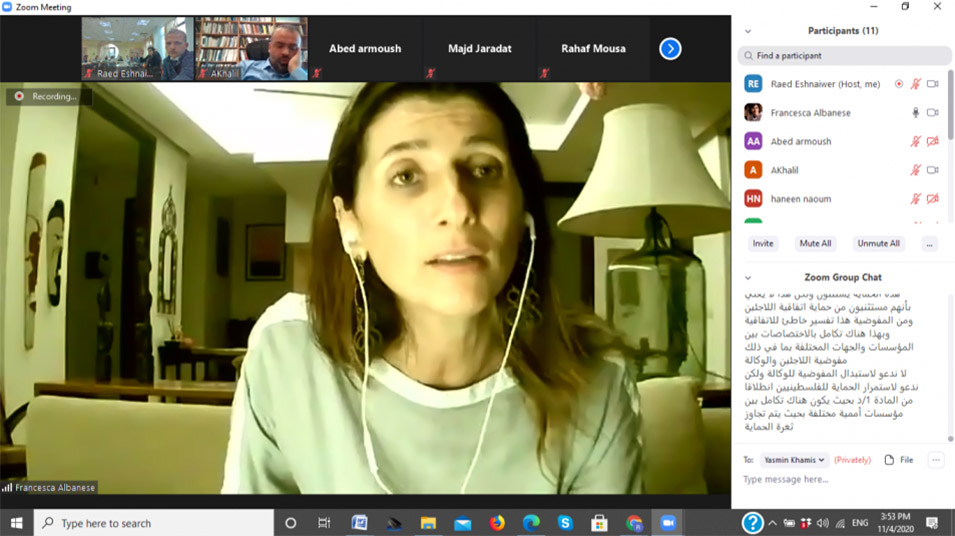Birzeit students discuss Palestinian refugees in international law with Albanese, Takkenberg
Birzeit University students explored the legal status and political realities of Palestinian refugees under the purview of international law in an online discussion with Francesca Albanese, a researcher at Georgetown University’s Institute for the Study of International Migration; Lex Takkenberg, the senior ethics officer at UNRWA; and Asem Khalil, a professor of public and constitutional law at Birzeit University.
The discussion, organized on Wednesday, November 4, 2020, is part of the university’s newly launched International Migration and Refugee Studies master’s program, which focuses on presenting Palestinian students with an international perspective on migration, immigration, and refugee issues and, in the process, attempts to formulate a new outlook on the situation of Palestinian refugees, and the response thereof, regionally and internationally.
One of the main themes of the discussion was Albanese and Takkenberg’s newly released edition of “Palestinian Refugees in International Law,” an update and revision to Takkenberg’s original 1998 seminal work on legal responses to Palestinian refugees both in Arab and Western countries.
Mirroring the four main areas upon which the book focuses, Albanese first reviewed the legal status of Palestinian refugees from the collapse of the Ottoman Empire in the early parts of the 20th century to the Israeli occupation of Gaza, the West Bank, and East Jerusalem in 1967.
The author also presented a critical interpretation of the 1951 UN convention on refugees, arguing that Article 1D of the original convention applies to Palestinian refugees displaced in 1948 and 1967, thus ensuring complementarity in the functions between UNRWA and the United Nations High Commissioner for Refugees (UNHCR) as regards Palestinian refugees. Additionally, Albanese highlighted the international frameworks that grant Palestinian refugees legal protections, such as international humanitarian law, international human rights law, and international treaties and conventions on statelessness.
Wrapping up her talk and opening the floor for comments and questions, Albanese stressed the need to adopt a multi-lateral, UN-based perspective to solving the Palestinian refugee crisis within the purview of the relevant legal conventions and frameworks.
Raed Eshnaiwer, a professor at the Ibrahim Abu-Lughod Institute of International Studies who leads the introductory course for the migration and refugee studies program, said that the talks and discussions are part of the program’s focus on mixing theory and practice. The course he leads hosts international migration and refugee thinkers, experts, and professors, as well as activists, refugees, and migrants from areas all over the world to present students with authentic experiences from which they could draw lessons and inspiration.
The talks, Eshnaiwer added, are part of the KnowWar project, which includes partners such as the Department of Development Studies at the University of Vienna, the Centre for Development Studies at Birzeit University, and the Syrian Center for Policy Research, among others. The project aims to examine research produced on conflict, especially with regards to reconstruction and repatriation, research methodologies, and economies of war.







